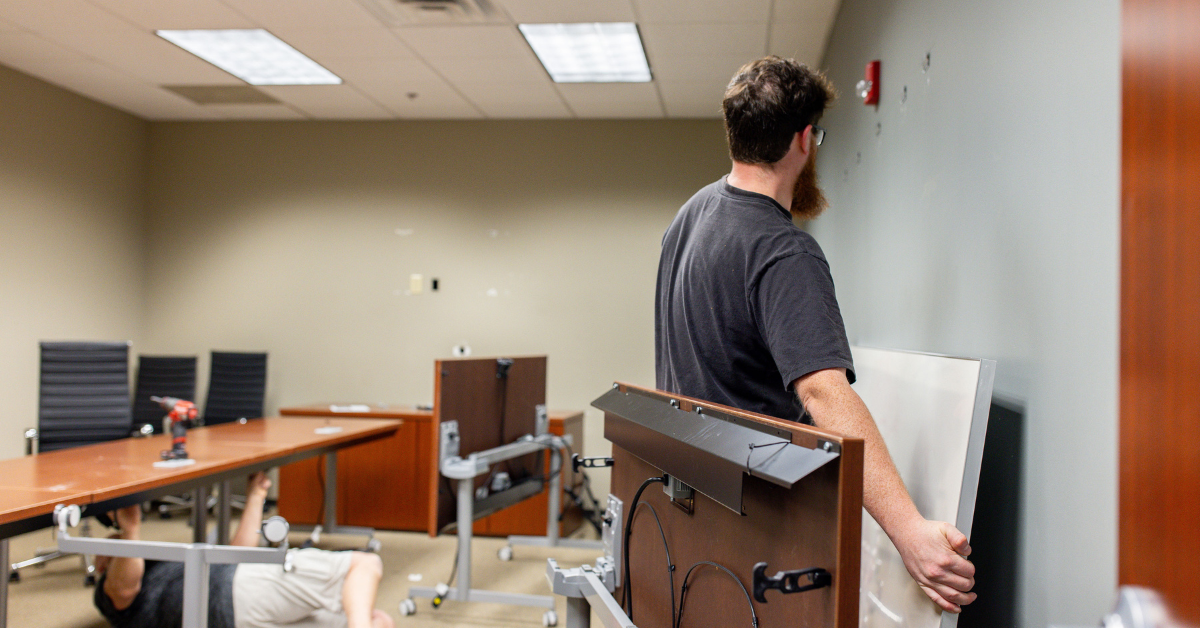Choosing the Right Moving Company for Your Business

Relocating a business is a complex undertaking, far more intricate than simply moving your household belongings. It involves careful planning, meticulous organization and the coordination of numerous moving parts (literally!). The downtime and disruption to your operations can significantly impact productivity and your bottom line.
That’s why choosing a quality moving company is absolutely crucial. A reliable and experienced commercial mover can alleviate much of the burden, ensuring a smooth transition and minimal disruption to your business. They can handle the heavy lifting, the logistics and even the finer details, allowing you to focus on what matters most – running your business.
Understanding Your Business Relocation Needs
Before you embark on the journey of selecting a relocation company, it’s essential to take stock of your specific relocation needs. This will enable you to identify a moving company that possesses the necessary resources and expertise to handle your move effectively.
Size and Scope
The scale of your relocation plays a significant role in determining the appropriate moving partner. Relocating a small office with minimal equipment and personnel will have different requirements than a large corporation moving entire departments across multiple floors or buildings. Warehouse relocations, with their heavy machinery and specialized equipment, present another set of unique challenges.
Specific Requirements
Consider any specialized needs your business may have. Does your relocation involve sensitive equipment such as servers, laboratory instruments or manufacturing machinery? These items often require specialized handling, transportation and security protocols to prevent damage. If your move involves confidential documents or high-value assets, ensure the moving company has robust security measures in place.
Additional Services
Beyond the core moving services, evaluate your need for supplementary assistance. Packing and unpacking services ensure the careful handling of your belongings. Temporary storage solutions may be necessary if your new premises are not immediately available or if you need to declutter before the move. Finally, consider whether you require assistance with the setup and configuration of furniture, equipment and IT systems in your new location.
Timeline Specifics
Developing a realistic timeline is crucial for a smooth relocation. Factor in lease expirations at your current location and any potential delays in accessing your new premises. Consider the time required for packing, transporting and unpacking your belongings, as well as the time needed to set up and configure equipment in your new space. If your business is dependent on seasonal factors or specific deadlines, these must be incorporated into your timeline. A well-defined timeline will help you coordinate with your moving partner and minimize disruption to your operations.
Inventory Assessment
Conduct a thorough inventory of all items to be moved. This includes furniture, equipment, IT assets and any other relevant belongings. Documenting your inventory helps you estimate the volume and weight of your possessions, which is essential for determining the appropriate truck size and moving resources. An inventory also serves as a checklist to ensure that nothing is lost or misplaced during the move.
Factors to Consider When Choosing a Moving Company
Now that you have a clear understanding of your needs, it’s time to research potential moving companies. Here are several factors to consider:
Experience and Expertise:
- Industry Experience: Look for professional movers with a proven track record in commercial relocations. Moving a business is different from moving a household, and you need a partner who understands the unique challenges involved.
- Industry Expertise: If your move involves specialized equipment, sensitive materials, or complex logistics, hire movers with the necessary expertise and resources to handle it.
Licensing and Insurance:
- Proper Credentials: Verify that the moving company has proper licensing and is fully insured. This protects your business in case of accidents, damage or loss during the move.
- Liability Coverage: Inquire about their liability coverage and valuation options to ensure your assets are adequately protected.
Reputation and Reviews:
- Online Research: Check online reviews and testimonials on platforms like Google My Business, Yelp and the Better Business Bureau to get a sense of the moving company’s reputation and customer satisfaction. You can also reach out to your local consumer affairs agency for any records of complaints or issues related to the company. This can help you narrow down your choices to the most reputable moving companies, ensuring you’re working with a trusted partner.
- Case Studies: See if the mover has case studies or examples of successful business relocations they have handled in the past. Don’t hesitate to ask for references from previous clients and contact them to inquire about their experience.
Range of Services:
- Comprehensive Services: Ideally, your moving partner should offer a comprehensive range of services to meet your needs, including packing, crating, loading, transportation, unloading, unpacking and even storage solutions.
- Customization: Can they tailor their services to your specific requirements? A good mover will be flexible and willing to work with you to create a customized moving plan.
Evaluating Moving Companies: What to Ask
Once you’ve narrowed down your list of potential moving partners, it’s time to start asking some important questions. Reputable moving companies will be open and transparent when answering your inquiries. This will help you gauge their reliability, transparency and suitability for your business relocation. Here are some key questions to consider:
1. What is your experience with moves similar to ours?
Don’t hesitate to get specific. Describe the size of your business, the type of equipment you have, and any unique challenges involved. Their response will give you insight into their expertise and ability to handle your relocation.
2. How do you handle valuable or sensitive items?
If you have items that require special care, such as computers, servers, artwork, or confidential documents, inquire about their procedures for packing, handling, and transporting these items securely.
3. What is your claims process in case of damages or loss?
Accidents can happen, so it’s essential to understand the company’s insurance coverage and claims process. A reputable moving company will be transparent about its procedures and have a clear system in place for handling any issues that may arise.
4. Can you provide a detailed, itemized estimate?
Avoid movers who provide vague or generic quotes. Request a detailed breakdown of their services and costs, including:
- Transportation costs
- Packing materials and labor
- Insurance and valuation options
- Any additional services you require (storage, setup, etc.)
5. What is your policy on delays or unforeseen circumstances?
Unexpected issues can occur during a move. Therefore, it’s essential to inquire about the moving company’s flexibility and how they handle potential delays or changes to the schedule. A reliable moving partner will have contingency plans in place and will communicate proactively with you to minimize disruptions to your operations.
Comparing Quotes: Why Cheaper Isn’t Always Better
When evaluating moving quotes, it’s tempting to choose the lowest price to try to save money. However, when it comes to business relocation, cheaper isn’t always better. Start by gathering estimates from multiple companies to get a full picture of what’s included in each service package. This allows you to compare prices and services to ensure you’re getting the best overall value.
Opting for a significantly lower quote can sometimes lead to unexpected costs, compromised service and potential headaches down the road.
Comparing Apples to Apples
When comparing quotes from different moving companies, make sure you are comparing “apples to apples.” Ensure that each quote includes the same services, such as packing, loading, transportation, unloading and unpacking. Pay close attention to the level of insurance coverage included and any additional fees for services like disassembly and reassembly of furniture or handling of specialty items. This allows you to make an informed decision based on the overall value provided, rather than simply choosing the lowest price.
Potential Risks of Low-Cost Providers
Even with accurate quotes, be wary of choosing a service provider solely on price. Low-cost movers may cut corners in ways that can negatively impact your relocation:
- Unqualified Workers: They might employ inexperienced or untrained workers who may not handle your equipment and belongings with the necessary care.
- Hidden Costs: Beware of hidden fees or extra charges that weren’t included in the initial quote. This can lead to a final bill that is much higher than expected.
- Sub-standard Equipment: They might use older or poorly maintained trucks and equipment, increasing the risk of delays or damage during transport.
- Poor Communication: Communication can be lacking, leading to confusion, missed deadlines and frustration throughout the moving process.
Importance of a Detailed Moving Contract
Before finalizing your choice, ensure the moving company provides a detailed, itemized contract rather than a blank moving contract or a vague agreement. A contract lacking specifics can lead to unexpected expenses or misunderstandings about the services included, which may impact both your budget and timeline. A clear, comprehensive contract should specify the scope of services, costs, timeline and any additional fees, helping you avoid surprises. Look for transparency around key aspects such as:
- Services Included: Verify that services like packing, transportation and setup are explicitly listed in the contract.
- Additional Fees: Ensure any fees for special handling, storage or other extras are disclosed upfront.
- Liability and Claims: Confirm that the contract details the company’s liability for damages and outlines the claims process.
Making the Right Move for Your Business
Relocating your business is a significant undertaking that requires careful planning and execution to ensure a smooth transition. Choosing a reliable moving company is essential to achieving this goal. By selecting a company with the experience, expertise and resources to handle your specific needs, you can alleviate much of the stress associated with moving and focus on what matters most: running your business.
At The Armstrong Company, we understand the complexities of business relocation. With our years of experience, comprehensive range of services and commitment to customer satisfaction, we are the trusted partner you need to navigate this important process. We pride ourselves on providing customized moving plans tailored to your unique requirements, ensuring a seamless and efficient transition for your business.
Ready to make your move? Contact Armstrong today for a free quote, and let us help you plan a stress-free relocation.
